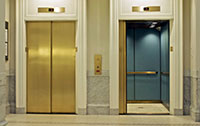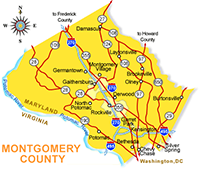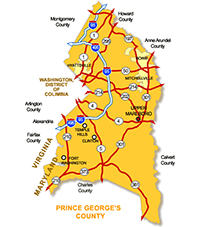Maryland At Issue - October 2018
State
Changes to Elevator Tests Effective Oct. 1
 New State legislation became effective Oct. 1 that will phase-in changes for witnessing of elevator safety tests. HB 1107, enacted at the 2018 General Assembly session, will require a third party qualified inspector (TPQI) to be physically present to witness annual and five-year elevator tests performed by elevator mechanics.
New State legislation became effective Oct. 1 that will phase-in changes for witnessing of elevator safety tests. HB 1107, enacted at the 2018 General Assembly session, will require a third party qualified inspector (TPQI) to be physically present to witness annual and five-year elevator tests performed by elevator mechanics.
For the past 20 years, the State Department of Labor, Licensing and Regulation (DLLR) has allowed for on-site post-test reviews of safety tests by licensed elevator inspectors. The new law will require TPQIs to physically witness the 5-year private elevator tests starting 10/1/18 (rather than a state inspector), and the annual tests of private elevators starting 10/1/20. State inspectors will retain oversight of new construction and upgrades, and pre-final inspections by TPQIs of new construction and upgrades will be eliminated.
Testing will be scheduled by either the owner or TPQIs. DLLR will provide a report to the General Assembly by 1/1/20 on the status of how elevator inspections are being conducted under the legislation. AOBA opposed this legislation due to concerns that scheduling the elevator mechanic and elevator inspector to both be present for testing will not improve safety, but will cause delays and extra costs to management, and that elevator repair companies and inspectors will charge for more hours since the testing and inspections take longer.
Just Cause Eviction Study Holds Second Meeting
A second meeting of a workgroup studying “just cause eviction” legislation for Montgomery County was held on Sept. 20 in Rockville. The group is examining the issue of whether just cause eviction legislation should be recommended to the Montgomery County House of Delegates Delegation for the 2019 General Assembly session. The outcome of the study group is not in doubt, since it is chaired by the bill sponsor of the proposed 2018 just cause legislation, and comprised of nine tenant advocates and one AOBA representative.
The Sept. 20 meeting included a detailed review of steps in the current eviction process and a discussion of just cause eviction laws in other jurisdictions. In advance of the meeting, AOBA requested time on the agenda to present comments from property managers regarding typical reasons for issuing notice to vacate letters, but was denied.
AOBA members with residential rental properties in Montgomery County should anticipate the reintroduction of legislation at the 2019 session of the General Assembly that would require rental property owners in the County to renew a tenant’s lease unless they can demonstrate one of 11 “just causes” for non-renewal. The new proposed legislation will likely become available for review in late November, with a bill hearing in Rockville on Dec. 3rd or 5th. Contact AOBA Maryland VP Ron Wineholt for further information at rwineholt@aoba-metro.org.
State Revenue Projections Up $732M
The State Board of Revenue Estimates recently increased its estimates of state general fund revenues for the next two fiscal years by $732 million. When combined with the FY 2018 closeout revenues that were $503 million above estimates, the state will have over $1.2 billion in unanticipated cash when the FY 2020 budget is considered at the upcoming General Assembly session.
The September Report of the Board indicated that leading drivers of the increased revenues were changes to federal tax laws and the recent Supreme Court decision allowing states to impose sales taxes on online retailers. The downside of the report is that some individuals and businesses will pay higher state incomes taxes in upcoming years unless the General Assembly acts to offset the impact of federal tax law changes.
C&I Energy Grants Available
The Maryland Energy Administration (MEA) has announced the opening of the FY19 Commercial and Industrial Grant Program. MEA will provide competitive grant awards to Maryland commercial entities that seek to improve the energy efficiency of their existing structures, or install energy efficient technologies that exceed code-minimum standards in to-be-constructed facilities. The C&I Program provides grant awards to commercial, industrial, and nonprofit enterprises in Maryland’s commercial and industrial sector to assist with energy efficiency projects that will reduce their electricity consumption by at least 15%.
Applications are due to MEA via their online application portal by 11:59 P.M. on Monday, Dec. 17, 2018. Awards will be issued on a competitive basis after careful review by MEA. Contact Caitlin Madera, MEA Commercial and Industrial Program Manager, for further information at caitlin.madera@maryland.gov.
Montgomery County
Proposed Recordation Tax Hike Given Extension
 As noted in the Sept. 25 Action Alert, the Government Operations and Fiscal Policy Committee pulled the proposed recordation tax increase bill, Bill 10-17 Recordation Tax - Rates – Amendments (Elrich, Leventhal sponsors), from its Sept. 27 agenda. While the bill was scheduled to expire on Oct. 4, the Council moved on Oct. 2 to extend the bill through June 30, 2019. Even with this extension, questions remain including about the: (1) impact on commercial transactions, all of which are in the $2million+ tier; (2) county’s competitive position in the region; and (3) possibility of another recession. Notably, many of the same concerns remain after four committee worksessions on the measure.
As noted in the Sept. 25 Action Alert, the Government Operations and Fiscal Policy Committee pulled the proposed recordation tax increase bill, Bill 10-17 Recordation Tax - Rates – Amendments (Elrich, Leventhal sponsors), from its Sept. 27 agenda. While the bill was scheduled to expire on Oct. 4, the Council moved on Oct. 2 to extend the bill through June 30, 2019. Even with this extension, questions remain including about the: (1) impact on commercial transactions, all of which are in the $2million+ tier; (2) county’s competitive position in the region; and (3) possibility of another recession. Notably, many of the same concerns remain after four committee worksessions on the measure.
Regarding next steps, it is unclear whether the committee will reconvene on this bill before the Nov. 6 general election, or the transfer of power on Dec. 3 when the new county executive and legislature take the oath of office. The transition does represent an opportunity for AOBA to educate the new councilmembers about this and other important issues.
Council Hits Pause Button on Proposed Solar/Green Roof Mandate
The Transportation, Infrastructure, Energy and Environment Committee (T&E) canceled a Sept. 27 worksession on B11-18 Buildings - Environmental Roof Design - Non-residential and Multifamily Buildings (Elrich, Hucker sponsors). As with the proposed recordation tax increase, the bill’s future could be impacted by the Nov. 6 and Dec. 3 events which will bring changes to the committee composition. AOBA will continue to educate current and incoming councilmembers about our concerns and proposed alternatives. For more information, see the April 2 Action Alert and AOBA’s testimony on the bill.
Berliner Seeks to Increase PACE Program Participation
Councilmember Berliner, the T&E committee chair introduced a measure, Bill 33-18 - Environmental Sustainability - Commercial Property Assessed Clean Energy Program - Property Tax Surcharge, that he hopes will remove what he views as an existing obstacle to greater owner/manager participation in the energy efficiency financing program. Current law requires the county to collect the amount financed through a surcharge on the property owner’s real property tax bill. The bill directs the Department of Finance to add the surcharge to the tax bill on July 1 of the year following execution of the financing agreement. Currently, the county places the surcharge after completion of the improvements. Additional resources: Current Montgomery County PACE law.
Member Action/Next Steps: The bill is tentatively scheduled for an Oct. 23 hearing at 1:30pm. Members should contact Nicola Whiteman with any comments or concerns.
Update: Required Summary of Tenant Rights and Responsibilities
As a reminder, DHCA has published the summary of tenants’ rights and responsibilities required by Montgomery County Code § 29-27(w). DHCA has made a Word version of the form available for members to facilitate use with existing computer systems. The agency advised that while companies can remove the County seal, the language “approved by Montgomery County OLTA” and change the formatting, the basic information must remain unchanged. Also, see the September 2018 edition of the Maryland At Issue for an overview of the law’s specific requirements.
Outdoor Smoking Ban coming to Montgomery County
Councilmember Sidney Katz introduced legislation, Bill 35-18 - Health and Sanitation - Smoking- Outdoor Serving Areas, to expand the county’s ban on smoking in public places to include “outdoor serving areas” controlled by an eating and drinking establishment. The bill defines “outdoor serving area” to mean a “patio, deck, porch, or other outdoor seating or serving area, whether partially enclosed or open to the sky, that is permitted for outdoor eating or drinking under the control of an eating and drinking establishment.” Current law prohibits smoking in any business or organization open to the public, including retail stores, banks, offices, factories, eating and drinking establishments, or any other private business or organization.
Member Action/Next Steps: Members with mixed-use communities may wish to provide feedback. A public hearing is tentatively scheduled on Oct. 23 at 1:30 p.m.
DHCA Hosts Oct. 18 Seminar for Housing Providers
DHCA will host an Oct. 18 seminar for housing providers on several topics including: changes to the Landlord-Tenant Law; housing code enforcement; and licensing and registration. Note: the information at this seminar is geared toward operators of single family rental homes and small multifamily dwellings, however the agency encourages all housing providers to attend. Additional information: Oct. 18 Seminar for Housing Providers Flier; and Oct. 18 Housing Provider Seminar Registration Link.
Prince George's County
Council Moves Load of Bills to Public Hearings
 The Prince George’s County Council recently held a marathon session to move a large number of bills to a public hearing and final vote later this month. The final meeting of the Council for this term will be held on Oct. 23. Bills of interest headed to a final vote on that date include the following:
The Prince George’s County Council recently held a marathon session to move a large number of bills to a public hearing and final vote later this month. The final meeting of the Council for this term will be held on Oct. 23. Bills of interest headed to a final vote on that date include the following:
- Short-term Rentals - CB-11-2018 would require that hosts offering short-term rentals be licensed by the County, pay an annual fee, and be subject to extensive documentation of compliance with building code, housing code and fire safety standards. Short-term rentals could not exceed 30 consecutive days, a total of 90 days per calendar year if the owner is not present, or 180 days per calendar year if the owner is present.
Hosts could only offer a short-term rental if they were a permanent resident of the County, and the dwelling rented was the principal residence that they owned. A booking service used to facilitate a short-term rental would also be subject to County licensure, and be required to remit county hotel taxes. The bill would be effective Oct. 1, 2019.
- Zoning Rewrite - CB-13-2018 is a massive bill that would rewrite the County’s 50-year old zoning code. To appreciate the size of this task, consider that the Council adopted a 246-page amendment to the bill prior to advancing the legislation to a public hearing.
The Council has been working with the Planning Commission and its consultant for the past four years to develop a new zoning law and subdivision regulations that are more streamlined, consolidate zones and development standards, and incentivize economic and transit-oriented mixed-use development.If enacted, the laws will impact every real property parcel in the County and what may be done with the property in development.
The Council has also established a web portal to provide the public comprehensive information about the zoning rewrite. According to the timeline for implementation, if approved, it would require an additional 18 months through a comprehensive Countywide Map Amendment process to implement the zones in the new zoning ordinance.
- Noise Control - CB-18-2018, will establish more strict and enforceable noise control standards in the County. This bill would prohibit a person from causing noise that would exceed, at a receiving property, for residential properties, 60 decibels at day and 50 decibels at night, for commercial properties, 62 decibels at day and 57 decibels at night, and for industrial properties, 70 decibels. As under current law, persons violating the noise limits would be subject to citations issued by a police or DPIE enforcement officer, and after three citations within 60 days, the landlord could also be cited. Notice would be provided to the owner or landlord after the second citation.
- Landscape Manual - CB-65-2018 would adopt a new Landscape Manual for Prince George’s County. The new manual incorporates modern and sustainable landscape practices for new development. Existing conditions on developed sites may continue as a matter of right as long as they were otherwise lawful on the date the new manual was adopted. The manual adds specific multifamily requirements to the residential section.
- Nonconforming Uses - CB-91-2018 would permit certain alterations, enlargements, or extensions to certified nonconforming buildings, structures and uses without the requirement for a special exception when the nonconformity is increased due to a conveyance of land to a governmental agency for public use.
